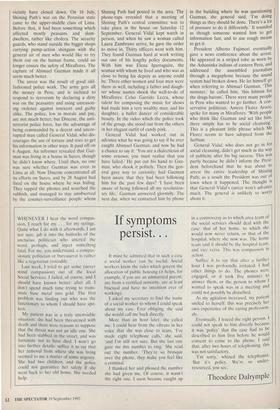If symptoms
persist.. .
WHENEVER I hear the word compas- sion, I reach for my . . . for my syringe. Quite what I do with it afterwards, I am not sure: jab it into the buttocks of the unctuous politician who uttered the word, perhaps. and inject something fatal. For me. you understand, a compas- sionate politician or bureaucrat is rather like a vegetarian crocodile.
Last week, I tried to get sense (never mind compassion) out of the local Social Services. I failed, of course, and I should have known better: after all. I don't spend much time trying to trans- mute base metal into gold. The first problem was finding out who was the functionary to whom I should have spo- ken.
My patient was in a truly unenviable situation: she had been threatened with death and there were reasons to suppose that the threat was not an idle one. She had been stabbed in the street, and was fortunate not to have died. I won't go into further details: suffice it to say that her removal from where she was living seemed to me a matter of some urgency. She had two children, and the police could not guarantee her safety if she went back to her old home. She needed help. It must he admitted that in such a case a social worker can he useful. Social workers know the rules which govern the allocation of public housing (it helps, for example. if you are an unmarried parent, are from a certified minority. are at least bisexual and have no intention ever of working).
I asked my secretary to find the name of a social worker to whom I could speak about my case. Ever obliging. she said she would call me back directly.
More than an hour later, she called me. I could hear from the vibrato in her voice that she was close to tears. 'I've made eight telephone calls,' she said, 'and I'm still not sure. But the last one gave me this number to ring.' She read out the number. 'They're so brusque over the phone, they make you feel like a criminal.'
I thanked her and phoned the number she had given me. Of course, it wasn't the right one. I soon became caught up in a controversy as to which area team of the social services should deal with the case: that of her home, to which she would now never return, or that of the hospital. where she now was. The home team said it should be the hospital team. and vice versa. This was compassion in action.
Suffice it to say that after a further hour I was profoundly irritated: I had other things to do. The phones were engaged. or it took five minutes to answer them, or the person to whom I wanted to speak was in a meeting and could not possibly he disturbed. As my agitation increased, my patient smiled to herself: this was precisely her own experience of the caring profession- als.
Eventually. I traced the right person. I could not speak to him directly because it was 'policy' that the case had to be described to him first before he would consent to come to the phone. I said that, after two hours of telephoning, this was not satisfactory.
'I'm sorry,' whined the telephonist. 'But it's policy. We're so under- resourced, you see.'
Theodore Dalrymple


























































 Previous page
Previous page